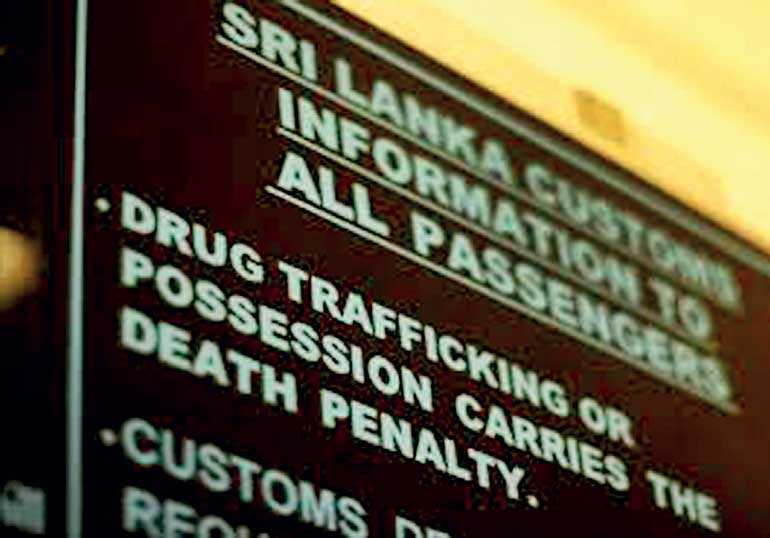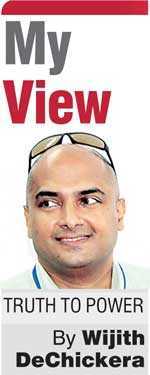Friday Feb 20, 2026
Friday Feb 20, 2026
Thursday, 26 July 2018 00:00 - - {{hitsCtrl.values.hits}}
 DRUG – barren? Some political leaders would hang ’em, other less militant types would have the police investigate errant MPs thoroughly for sundry misdemeanours; all the people can see is Sri Lanka’s “public secret, hidden shame”: a new, old, or once and future political culture in which the drug baron and other lords of misrule at the centre holds a sceptre over the sovereignty of the elected representatives of a once clean society.
DRUG – barren? Some political leaders would hang ’em, other less militant types would have the police investigate errant MPs thoroughly for sundry misdemeanours; all the people can see is Sri Lanka’s “public secret, hidden shame”: a new, old, or once and future political culture in which the drug baron and other lords of misrule at the centre holds a sceptre over the sovereignty of the elected representatives of a once clean society.
The political-signal-sending-savvy President’s outspoken call to execute drug dealers has been debated to the death – very nearly literally – most of the past fortnight or so. While prelates and clerics may have had their two cents’ worth to add (or subtract) from the vexed issue of capital punishment being implemented in our righteous society, virtual silence has prevailed in all quarters on the larger perhaps more pressing problem. That of the new socio-political culture of drugs: public secret, hidden shame; adding a sick twist to the politics of compromised national interest by branding a blessed isle a charnel house for chemical contraband.
We don’t know if the situation on the street is as bad as that buffoon of a police inspector in the all-too-brief Britcom ‘The Thin Blue Line’ made it out to be. Grim – by name and grimy by nature – estimated that ye merry old England had been overtaken by the scourge of non-pharmaceutical pills in all their alphanumerical spectrum then. “Today, it’s E. Tomorrow, it might be F – possibly even G.” And his straitlaced colleague, Chief Inspector Fowler, proved that he had his finger on the pulse of the cornucopia of British youth at the turn of the millennium.
“Drugs! What is wrong with young people today? With their uppers, downers, poppers, toppers, speed, whizz, crack, junk, smack, splosh, zing, bonk, bark…” – and that’s only the thin end of the bush, as Grim would say. In Sri Lanka, some two decades later, it’s probably not variety that is the spice of life… simply quantity – and availability, if not necessarily cheapness that is. According to an otherwise halfway decent bloke who never strayed too far from the straight and narrow, except a tryst with Mary Jane down in the potting shed (if you know whom or what I mean), Colombo is the Mecca of South Asian drug transit points.
“Sri Lanka is a large transhipment centre for all types of drugs. We do not consume even 10% of the drugs that are smuggled into the country. The politicians knowingly back these drug kingpins as it is seen as entrepôt trading,” says someone with the contacts and keener than usual insight into our burgeoning port city’s incognito business ventures.
He adds, explaining the rationale for braving the hangman: “The retail price of white heroin in Pakistan is $ 3 per gram. In Colombo, it is $ 12.50 per gram. And therein lies the incentive to engage in the trade.” And heads of state with a desire to flex their executive muscles as well as their cardinal mistake-making clerics’ approbation be hanged!
Then it was bliss to be alive
To be fair by our sitting President, his then passion-fuelled ‘Good Governance’ platform yawned wide under the swinging legs of a big crack business. I still remember the Fourth Estate being as keen as the pals of the First Citizen to credit executive prerogatives with a now long-forgotten crackdown which yielded a huge drug bust. But today such breakthroughs are as rare as architects of the ‘100 Day Plan’. They have proven – as much as smalltime dope peddlers outside naïve and unsuspecting urban schools – to be fly-by-night operators.
Plus, in a milieu where our Coalition Government is flying (I use the word charitably for a contraption that’s as clearly grounded as Mattala Airport) by the seat of its pants, the likes of SSP Lugoda and other superheroes to combat crime are two a penny. Tuppence for your thoughts, too, O mandarins mandated with enforcing law and order in our land…
Now, once again
My mind goes back to another British TV series of which I was a fan then and an aficionado in its long-lived aftermath now: Blake’s 7. The cult sci-fi classic BBC programme, which was telecast to peak-time audiences in the tens of millions at its height, ran from 1978-81 before its abrupt, unforgettable, unfathomable climax after 52 episodes of gritty television (albeit low-budget effects-driven).
That its characterisation, however, cut so close to the skin of then contemporary Soviet, Thatcherite, and Reaganist politics gave it an edge over rivals and contenders like Dr. Who, for instance. Also, with its innovative tropes, story arcs, and inversion of conventional values, especially politically norms, it scarred my youthful mind’s-eye. There was a host of insightful portrayals by skilled Shakespearean actors in complex roles whose characters’ vices and virtues still ring true today – even in CGI’s gobsmacking milieu with its widescreen, big-splash, OTT space operas.
Now, and then
A particular episode remains pertinent from the perspective of contemporary political happenstance. The eponymous hero of Blake’s 7 is a political agitator against a corrupt Terran Federation. In his epic struggle against this Earth-based civilian military administration – backed up by the mindless tyranny of Space Command, its military arm – he, by default, recruits a ragtag motley crew of criminals to rebel against galactic oppression. Then, by design, Blake seeks to enlist the help of the notorious Terra Nostra – a systematic cartel dealing in general crime and terror but specialising in mind-numbing drugs.
While his initial efforts to persuade the Terra Nostra to join forces with him fails, Blake persists in his efforts to undermine the administration’s power in the outer planets using elements of the criminal underworld who might be willing to join the rebellion. En route to that goal, the rebel leader discovers a dark secret that could blow the lid off the oppressive civilian administration.
The planet on which the Terra Nostra’s source of power is located is discovered by Blake and his companions Avon (a top-notch bank swindler) and Jenna (the second-best but arguably prettiest smuggler in the galaxy) to be heavily guarded – by none other than Federation troops! The President of the Terran Administration controls the production and distribution of Shadow, the narcotic that keeps billions of souls in abject slavery!
As one character remarks, it’s a subversive strategy: to control people at both ends of the power spectrum using a single power source. Law and order as well as lawlessness are both regulated from the same origin: the despotic political regime that operates simultaneously above and below the law.
And then, again
Art, some wit once said, imitates life. Too closely for the liking of those who have little taste for shadows where there could or should be light. For even in a world where nothing is ever black or white, especially in politics, the darker shades of grey where dirty business overshadows political integrity and the clean appeal of an untarnished national reputation can and must be banished under the rule of leaders entirely great.
Thus, our minds hark back to that unsavoury episode in which a then sitting president of a nameless island republic personally flew to a western hamlet to rescue a drug baron from probes, even as law enforcement officers closed in.
And, to add insult to injury, the unforgiving television lens zooms in on the same mafioso MP as he – an erstwhile deputy minister – renders yeoman service at Sri Lanka’s first Independence Day celebrations under Good Governance: by opening an arriving would-be statesman’s car door. That latter worthy would now hang the man in the street with a light smattering of magic dust about his person – while the capo di capo tuttis of the coastal towns where the biz goes down still roam free. At large until some less than stalwart politico snaps them up to bolster flagging political power in a less than sterling cabinet.
But, shame be on him who thinks evil of it! For this is the new – and old – and once and future – ‘political culture’. Until, or unless, our presidents and prime ministers grow a pair… Unless that happens soon, a shadow will hang over our republic; until a person fit to challenge both the assassin’s bullet as well as the hangman’s noose comes riding out of the independent wings of a non-political circle, to lasso the drug baron in the same fell swoop as his political protector, supporter and preserver.
Until such time, a shadow hangs over our hangman-overshadowed republic. With no hope of redemption for the drug-induced and electronic dreams of denizens unknowingly noosing their own necks in apathy, ecstasy and then oblivion. But only the prospect of death or life imprisonment at the whim and fancy of bossy politicos and bumptious prelates.
Unless, of course, the present powers – President, Premier, and other stalwarts of the same sterling stamp – are able to take cognisance of perhaps the most insidious issue of our times. And, while they’re about it, remember the most pressing of these (according to a press report of some years ago based on National Dangerous Drug Control Board intelligence):
There are a dozen or so drug barons leading the mafia-style operation
An estimated 350-plus major drug dealers operate in Colombo, of which 50 are in wholesale transactions involving millions of rupees
Apart from these drug barons, another 300 operators were actively involved in the heroin market trading in small quantities of between 50 and 100 grams
At least 25 kilograms of heroin are sold in every major transaction, while some relative small-timers trade between one and two kilograms per op
An undisclosed number (believed to be in the thousands) deal in the retail market in the city and its suburbs
About 90% of the heroin entering the local market comes from Pakistan and South India – the bulk of which is smuggled in by boat across the Palk Strait
The main ports of call are Negombo, Chilaw, Mannar; but the contraband reaches areas such as Marawila, Panadura, Beruwala, Hikkaduwa, Akkaraipattu, Arugam Bay, Kalmunai, Batticaloa, Trincomalee and Talaimannar
The bulk of the smugglers using the sea route between Sri Lanka and India have been identified as wealthy boat owners from Negombo and Chilaw
A kilogram of heroin sells on the street between Rs. 4.5-6 million and six million, depending on the grade
(Journalist | Editor-at-large of LMD | Writer #SpeakingTruthToPower)